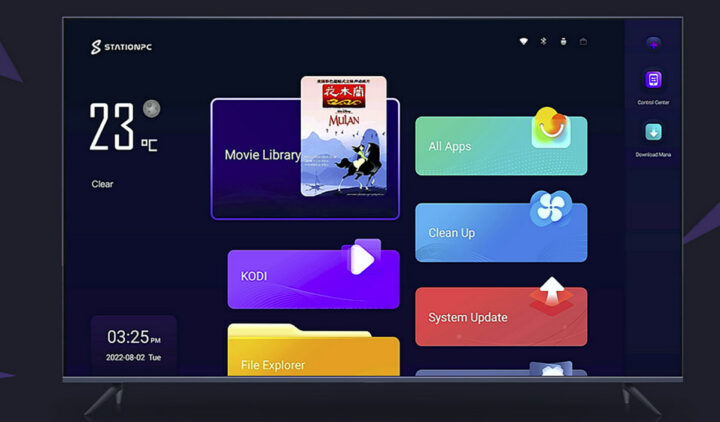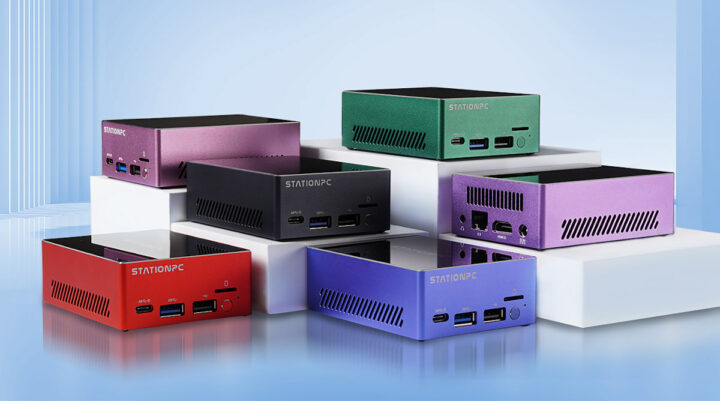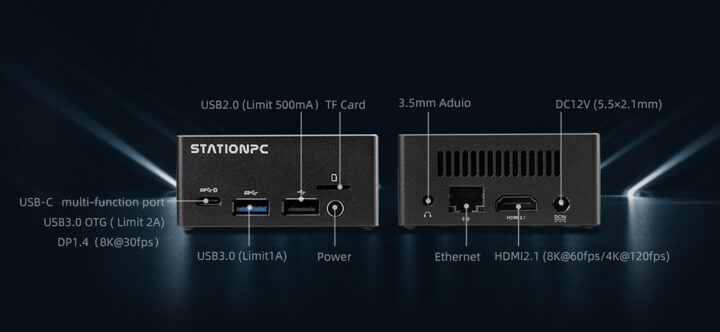Firefly Station M3 is a mini PC powered by Rockchip RK3588S octa-core Cortex-A76/A55 processor, the cost-down version of the RK3588, and equipped with up to 16GB RAM, 128GB eMMC flash storage, support for M.2 SATA and NVMe SSD, 8K capable HDMI and DisplayPort (USB-C) video outputs, Gigabit Ethernet, WiFi 5, and more.
The new model follows the Station M1 and Station M2 mini PCs with Rockchip RK3328 and RK3566 respectively and will deliver 4 times the CPU performance and up to 8 times the 3D graphics performance compared to the M2 model, but in a slightly larger and about twice as thick enclosure – probably for active cooling – than the first two Station M fanless mini PCs.
Firefly Station M3 specifications:
- SoC – Rockchip RK3588S octa-core processor with 4x Cortex-A76 cores @ up to 2.4 GHz, four Cortex-A55 cores, Arm Mali-G610 MP4 quad-core GPU with OpenGL ES 3.2, OpenCL 2.2, Vulkan 1.1 support, 6 TOPS NPU, and an 8Kp60 H.265/VP9/AVS2 video decoder, 4Kp60 decoder, 8Kp30 H.265/H.264 video encoder
- System Memory – 4GB, 8GB, or 16GB LPDDR4
- Storage
- 32GB, 64GB, or 128GB eMMC flash
- M.2 SATA 3.0 or PCIe 2.0 socket for 2242 SSD. Note: SATA 3.0 is multiplexed with PCIe 2.0 in RK3588S, so it should be selectable by software.
- MicroSD card socket
- Video Output
- 1x HDMI 2.1 port up to 8Kp60 or 4Kp120
- 1x USB Type-C port via DisplayPort 1.4 Alt mode up to 8Kp30
- Audio – 3.5mm headphone jack, digital audio output via HDMI and USB-C?
- Networking – Gigabit Ethernet port, dual-band 802.11b/g/n/ac WiFi 5 and Bluetooth 4.2
- USB – 1x USB 3.0 port, 1x USB 2.0 port, 1x USB 3.0 OTG Type-C port with DisplayPort Alt mode
- Misc – Power button, recovery button (inside audio jack)
- Power Supply – 12V DC via 5.5/2.1mm power barrel jack
- Power Consumption
-
- Idle – 0.42W (12V/35mA)
- Typical – 3W (12V/250mA)
- Max – 14.4W (12V/1200mA)
-
- Dimensions – 96.6 x 73 x 32.8 mm
- Temperature Range – Operating: -20°C to +60°C, storage: -20°C to +70°C
Except for some internal connectors which are not accessible from a mini PC, the hardware specifications are basically the same as the ones for the Firefly ROC-RK3588S-PC SBC, so it should safe to assume the Station M3 is based on that board. By default, the mini PC ships with Station OS, an operating system based on Android with multimedia and retro-gaming in mind, and a brand new UI, but also supports Android 12, Ubuntu 20.04, and we’re also told UEFI boot is supported (TBC). The wiki has not been updated for Station M3 just yet.

Firefly has not provided availability and pricing information just yet, but you should eventually be able to purchase the Station M3 mini PC through the product page, where you’ll find a few more details at this time. But for reference, we can check out ROC-RK3588S-PC pricing with the 4GB/32GB configuration going for $219, the 8GB/64GB model for $299, and the 16GB/128GB for $409. Add $20 to $40 extra for the enclosure and potential accessories, and that should be a fair estimate of the price.
Via AndroidTVBox.eu

Jean-Luc started CNX Software in 2010 as a part-time endeavor, before quitting his job as a software engineering manager, and starting to write daily news, and reviews full time later in 2011.
Support CNX Software! Donate via cryptocurrencies, become a Patron on Patreon, or purchase goods on Amazon or Aliexpress






